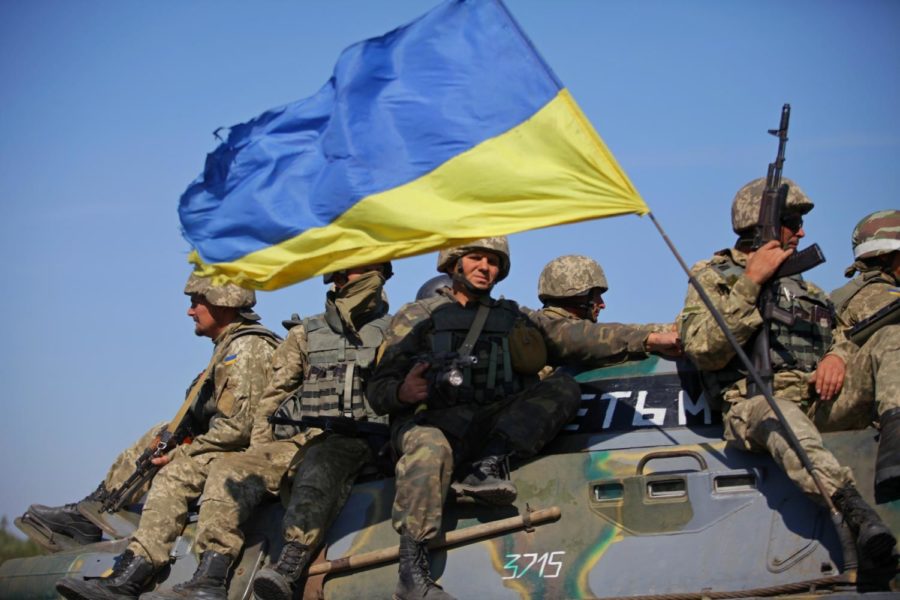The Invasion of Ukraine Was Preventable
Ukrainian forces have mounted a stiff defense to the Russian invasion.
The devastating consequences of the current Russian invasion in Ukraine are evident. Russian forces advance to Kiev, the death toll continues to rise, and many analysts question whether the conflict will escalate to nuclear devastation. However, a full scale war could have been avoided had the Minsk plan—an existing proposal formerly negotiated and approved by involved parties—been implemented.
The Minsk II agreement, devised by France, Germany, Russia, and Ukraine and endorsed by the EU, US, and UN in February 2015, would have allowed Ukraine to maintain territorial integrity and was hence the only logical solution that had been proposed. The plan, through decentralization in Ukraine, ensured political autonomy for Donbass, a Ukrainian region with multiple Russian-backed separatist territories that have recently been recognised by Russia as independent states—a decision confirming Russia’s abandonment of attempts to influence domestic Ukrainian politics without use of military force. The plan also called for demilitarization by disarming separatists and removing Russian forces and aimed to restore Ukrainian sovereignty. However, this solution was buried by the US political establishment and media because of the US government’s refusal to pressure Ukraine for implementation. In addition, the cruel and unnecessary war waged against Ukraine—in which mass suffering and destruction is guaranteed—is both the fault of the Russian government, which has grossly abandoned all statesmanship through this attack, and the US and other NATO allies, which have aggravated Russia through NATO expansion and thus produced the conditions of the conflict.
Minsk II protocols were not enforced predominantly due to disagreement regarding the sequence in which Donbass would gain autonomy: Ukraine had insisted that taking full control of the frontier with Russia in Donbass and disarming local forces occur before local elections are held and Ukrainian government passes a law that amends the country’s constitution to allow Donbass autonomy. Otherwise, it argued the elections are prone to interference from Moscow. Likewise, the Russian government and separatists believed that by allowing Ukraine to establish full control before they change the constitution and local elections are held, Kiev may rig the elections and Donbass will not be granted autonomy. Ultimately, the United States and European Union should have ensured Ukraine upheld these democratic commitments of revising the constitution to allow for decentralization and Russian language rights and announced their support of a muti-ethnic, pluralist republic.
In an essay in July 2021, Putin suggested that Russia may annex Donbass if Ukraine does not enforce the Minsk II plan, writing that he was “becoming more and more convinced of this: Kiev simply does not need Donbass.” The primary reason why Ukraine refused to grant autonomy for Donbass is that the region could, through use of newfound constitutional position, prevent Ukraine from joining the EU or NATO in the future; the Minsk II protocols effectively allow for Russian-speaking provinces in Donbass to veto NATO or EU membership. Officially, the US supports future Ukraine NATO membership—however vapid this commitment really is—and thus had not been helpful in resolving the crisis. However, as long as Ukraine is part of a territorial conflict, it will not be invited to join NATO or the EU. Even if a US administration wanted to invite Ukraine, this proposal would be vetoed by Germany and France, as has happened in the past.
It is worth noting the reason for the escalation of American involvement to begin with. Domestically, the Biden administration is flailing, looking at low approval ratings and what will probably be a bad midterm election for democrats. War has proved an effective way to drum up public support and distract the masses from criticizing the government or domestic problems. In addition, the US is trying to navigate maintaining the present postwar dynamic in Europe. In order to strengthen American hegemony – a power that has been declining since the end of the Cold War – the US must ensure European states remain aligned with the US instead of Russia by keeping the latter as isolated as possible. This vision of the global order is the driving force of Nato expansion, even though the alliance has had no real justification since the collapse of the Soviet Union. Rather, it currently exists as pretext to allow powerful states—that is, NATO members—to deploy threats or actual use of military force within what is effectively a worldwide “area of jurisdiction”; namely, the faculty for “humanitarian intervention” as outlined in the Responsibility to Protect (R2P) doctrine. Essentially, American involvement has only provoked Russia profoundly and made the conflict more dangerous, when the US really has no argument interfering with Ukrainian politics.
Could the West have imposed enough economic pressure that Russia abandoned Donbass before attaining autonomy? Can Ukraine, without being a part of NATO, defeat Russia in war? If the Donbass conflict is not resolved, can Ukraine ever join the EU? As the sole response to all these questions is a resounding “no,” Minsk II was really the only feasible solution for the immediate future. Furthermore, the terms of this agreement would have been welcomed by the Ukrainian population: opinion polls indicate that large majorities in Eastern and Southern Ukraine are in support of a multi-ethnic republic that includes an official status for the Russian language and culture. Ultimately, a federal constitution would be a more accommodating political apparatus for the Ukrainian republic where there is a wide range of cultural and language differences across the country.






